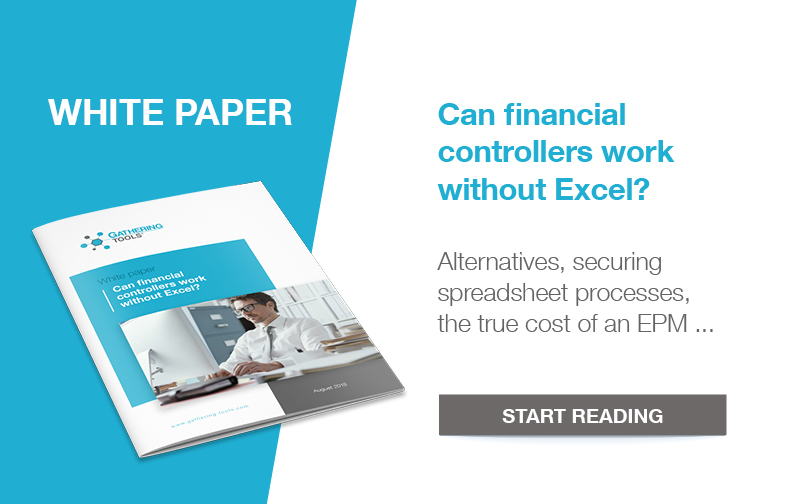EPM solutions have everything to appeal to financial departments and management controllers such as business features (simulations, gap analysis, allocations, …), backed up by a data repository, a secured collection, and flow of data … In an SME, switching to such a solution from an existing “home” based on Excel processes, however, requires a thorough reflection, and at least a return on investment study.
An EPM, at what cost?
 Like any IT project, implementing an EPM entails a number of costs. Some are very direct such as, the bill of software licenses or service (SaaS) climbs quickly with the number of users. These can be numerous, even in an SME, where the data are entered directly by operational (logistics, production, HR …) without pre-consolidation by a controller dedicated to their entity. To these expenses, we will, of course, add support, technical assistance and the inevitable training of affected staff.
Like any IT project, implementing an EPM entails a number of costs. Some are very direct such as, the bill of software licenses or service (SaaS) climbs quickly with the number of users. These can be numerous, even in an SME, where the data are entered directly by operational (logistics, production, HR …) without pre-consolidation by a controller dedicated to their entity. To these expenses, we will, of course, add support, technical assistance and the inevitable training of affected staff.
The other big expense will come from migrating Excel processes to EPM. The teams in charge of budget planning and control will have to model their organisation in the new tool, carry their forms or rewrite their rules of simulation, allocation, etc. This may require workshops with IT specialists, on functional and technical aspects, so that the EPM interfaces with the other management software packages of the company – its ERP in particular. Incidentally, existing Excel “assets” – investment in worksheets-based processes, as well as all the expertise that was stored there – will be lost.
The bloated of an oversized EPM
 In larger companies, EPM solutions are needed because they enable the financial performance of complex organisations to be controlled, with complex cost structures and consolidation rules. In SME, below 1,000 employees, strategic planning and management control do not require such a range of possibilities.
In larger companies, EPM solutions are needed because they enable the financial performance of complex organisations to be controlled, with complex cost structures and consolidation rules. In SME, below 1,000 employees, strategic planning and management control do not require such a range of possibilities.
If one chooses a highly integrated EPM, the tool risks introducing some obstacles in the management of the repository or the evolution of the multidimensional models of data. The SME or a small-sized company will lose flexibility, where its Excel processes accompanied its growth with agility. It may even rely on Excel again if its reference becomes a factor of rigidity.
If the company is moving more towards a toolbox EPM, it may be able to tailor the solution to its needs. But this will be at the cost of a constant investment in development, at an unpredictable cost. But the management controllers aspire instead to focus on their missions of strategic management and analysis …
Invest in a tool that secures Excel processes
 Add to this that the arrival of an EPM will not mark the end of Excel, despite what the suppliers claim (while offering Excel plug-in). In practice, some users will continue to perform calculations or information collection with their spreadsheet, before transferring their data to the EPM. (Justifying their concern about the number of licenses.) Others will extract data from the EPM to do ad-hoc analysis or specific reporting with the graphical functions of their favorite spreadsheet.
Add to this that the arrival of an EPM will not mark the end of Excel, despite what the suppliers claim (while offering Excel plug-in). In practice, some users will continue to perform calculations or information collection with their spreadsheet, before transferring their data to the EPM. (Justifying their concern about the number of licenses.) Others will extract data from the EPM to do ad-hoc analysis or specific reporting with the graphical functions of their favorite spreadsheet.
To improve the quality of their data, the management controllers of an SME have an alternative to deploying an EPM such as securing existing Excel processes. Gathering Tools makes it possible to convert spreadsheets into structured documents, with a similar user interface. The tool automates the consolidation workflow, with versioning and validation tracking. The data is synchronised with the central system.
The management control teams of Kiloutou have thus flexibly secured the collection and quality of their budget monitoring data, without having to redefine tables and management rules. They avoided having to start from a blank sheet with a new tool. To discover all the advantages of Gathering Tools for management control in SME, contact us.





